9 Electric Car Statistics and Facts in Canada – 2025 Update
-
Pete Ortiz
- Last updated:
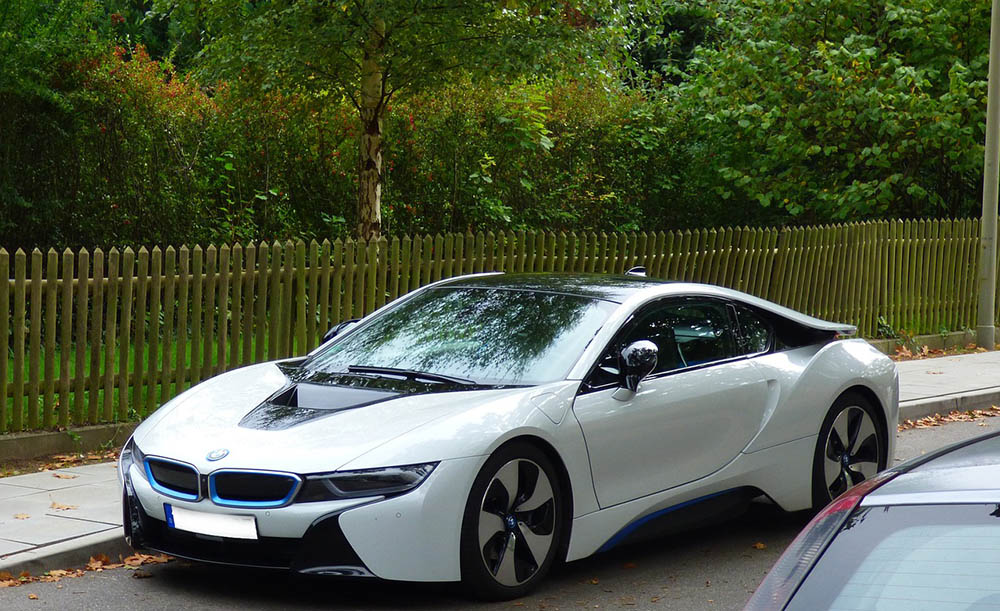
Note: This article’s statistics come from third-party sources and do not represent the opinions of this website.
Electric cars are not new. In fact, the first electric vehicles can be traced back to the late 1800s. Their market share really began being solidified in the 1900s. Nearly a third of the cars on the road during this time were electric.
Keep in mind that this was still very early electric automobile technology and was nothing compared to what we’re dealing with today. However, the 1990s was when manufacturers really began getting serious about new technology because of amendments to the Clean Air Act and Energy Policy Act.
This article explores nine relatively recent statistics around electric car use and sales in the Great White North.
Click below to jump ahead:
The 9 Electric Car in Canada Statistics
- In 2021, 93.4% of all-electric vehicles were registered in Quebec, Ontario, and British Columbia.
- As of 2021, electric vehicles comprised 5.2% of all new vehicle registrations in Canada.
- New electric vehicle registrations jumped up to 8.3% of the total new vehicles in the first part of 2022.
- Market share for gas and diesel vehicles declined 13.2% and 11.8% respectively in 2022.
- 71% of Canadians said they would buy an electric vehicle for their next purchase.
- In 2022, 49% of Canadians said they are more likely to buy an electric vehicle now than they were last year.
- Range matters, and 79% of Canadians won’t consider an electric vehicle unless it will travel more than 400 kilometers on a single charge.
- Cold weather can reduce an electric car’s range by around 20%
- 31% of electric car owners reported issues within the first 4 years.
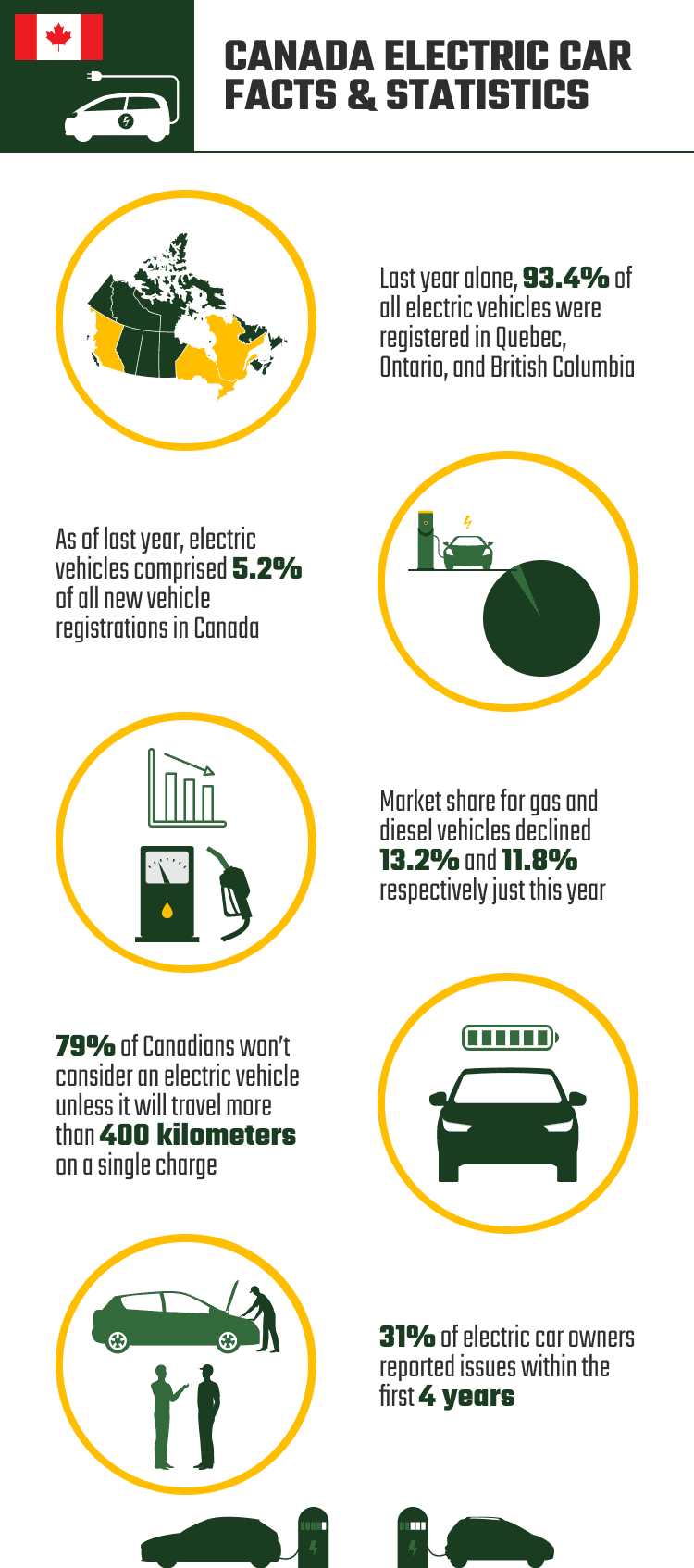
Sales
1. In 2021, 93.4% of all-electric vehicles were registered in Quebec, Ontario, and British Columbia.
(StatCan)
It makes sense that Quebec, Ontario, and British Columbia would boast the highest percentage of new electric vehicle registrations for a couple of reasons. First, these three provinces have the highest populations in Canada by a significant margin, so mathematically, it makes sense.
Another factor is that these three provinces are generally the most vocal regarding issues surrounding reducing emissions and global warming.
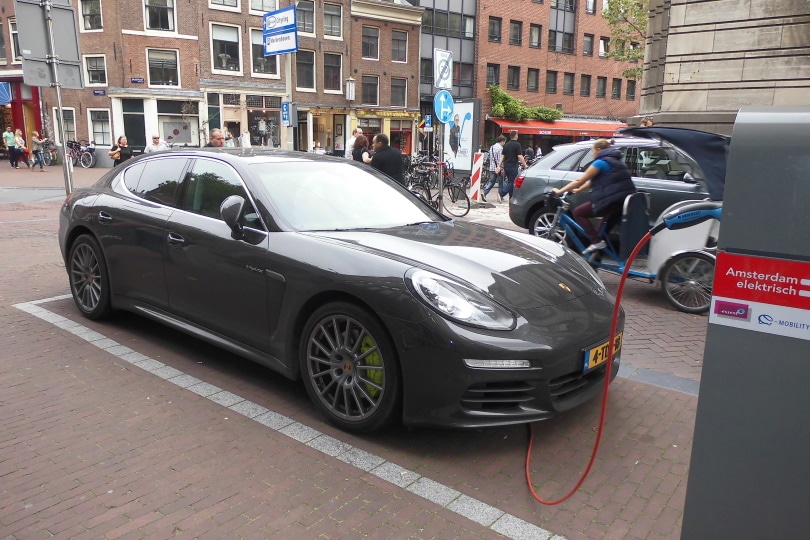
2. As of 2021, electric vehicles comprised 5.2% of all new vehicle registrations in Canada.
(StatCan)
One milestone that Canada hit in 2021 was the total number of new vehicles being registered that were electric. Just over 5% of them were emission-free. This is an important milestone because the Canadian Net-Zero Emissions Accountability Act, which became law in June 2021, captures Canada’s commitment to becoming net-zero on emissions by 2050. Vehicles certainly aren’t the only factor of emissions, but they are a significant one.
3. New electric vehicle registrations jumped up to 8.3% of the total new vehicles in the first part of 2022.
(ElectricAutonomy)
As we saw in the previous stat, new electric vehicle registrations were increasing. This was great news in itself. Then less than a year later, in the first quarter of 2022, new electric vehicle registrations increased another 3% over the previous year.
Heading into the second quarter, there was a slight drop down to 7.9%. However, there was a slight decrease in new vehicle registrations overall, so electric cars are expected to maintain their growth year over year.
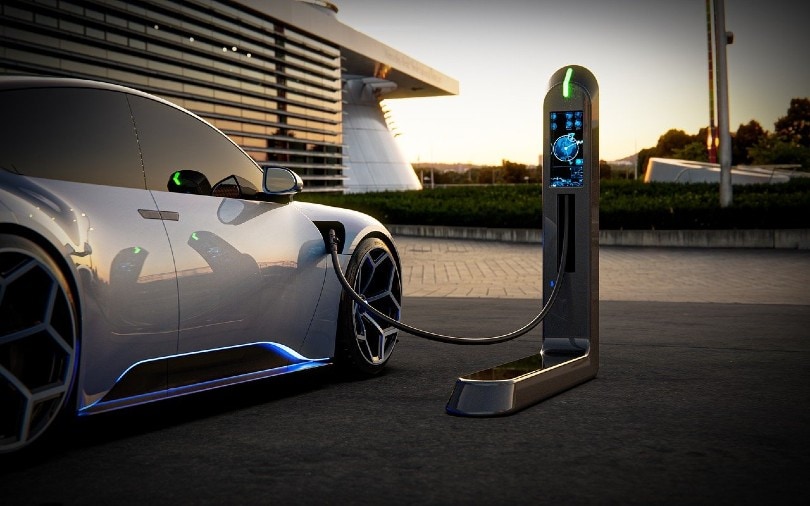
4. Market share for gas and diesel vehicles declined 13.2% and 11.8% respectively in 2022.
(Driving)
While there was a fairly steep decline in new registrations of gas and diesel vehicles in 2022, that does not necessarily mean that all those were replaced by electric cars. Much of that decrease is likely due to the economy.
However, there is definitely a shift in the industry because around the same time gas and diesel vehicle registrations are decreasing, the electric and plug-in hybrid (PHEV) are both going up. For example, PHEV vehicle registrations were up 3.8% over the 2021 reports as well.
 Consumers
Consumers
5. 71% of Canadians said they would buy an electric vehicle for their next purchase.
(KPMG)
It’s one thing to read statistics that show sales increases. But let’s look at some stats that show what consumers think and do. During a poll put out by KPMG, they found that 71% of Canadians would buy an electric vehicle for their next purchase.
This doesn’t necessarily mean that every single one of these people will follow through. However, this indicates an increase in electric vehicle sales going forward.
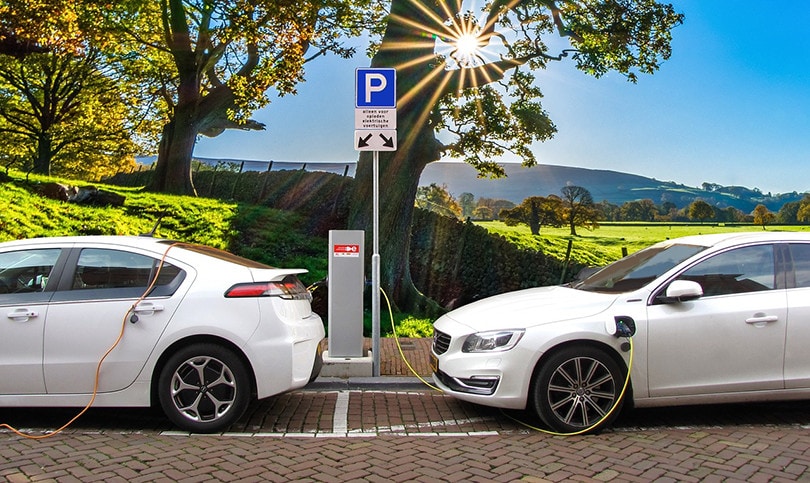
6. In 2022, 49% of Canadians said they are more likely to buy an electric vehicle now than they were last year.
(KPMG)
Another interesting statistic from this report was that nearly half of Canada said they were more interested in buying an electric vehicle now than they were last year or even pre-pandemic.
This will likely be an ongoing opinion as many people are getting on board with running cleaner technologies. Plus, our electric vehicle tech is also improving and making it much more suitable for the climate we have in Canada.
7. Range matters, and 79% of Canadians won’t consider an electric vehicle unless it will travel more than 400 kilometers on a single charge.
(KPMG)
Even though a large number of Canadians are getting on board with buying an electric vehicle, there is still a massive amount of hesitancy about them. Over three-quarters of Canadians that KPMG asked in the poll said they wouldn’t get an electric vehicle unless it would travel more than 400 kilometers on a single charge.
Some vehicles on the market will do this, such as a few Teslas or Toyotas. But they don’t all have this kind of range yet.
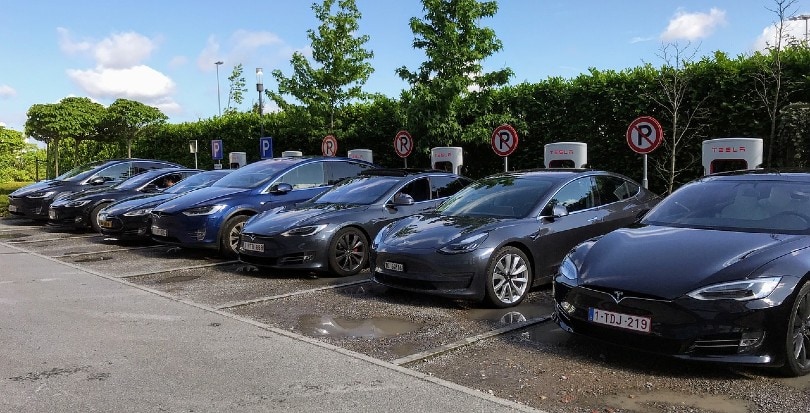
 Function
Function
8. Cold weather can reduce an electric car’s range by around 20%
(ConsumerReport)
What happens to batteries in cold weather? Generally, they don’t hold as good a charge and won’t last as long as they could under optimal conditions. This is a fairly prevalent question among Canadians and electric vehicles. Much of the year in many parts of Canada is cold. And if cold weather can reduce the range of an electric vehicle by around 20%
A plug-in hybrid is a good option because there is still an internal combustion engine as a backup.
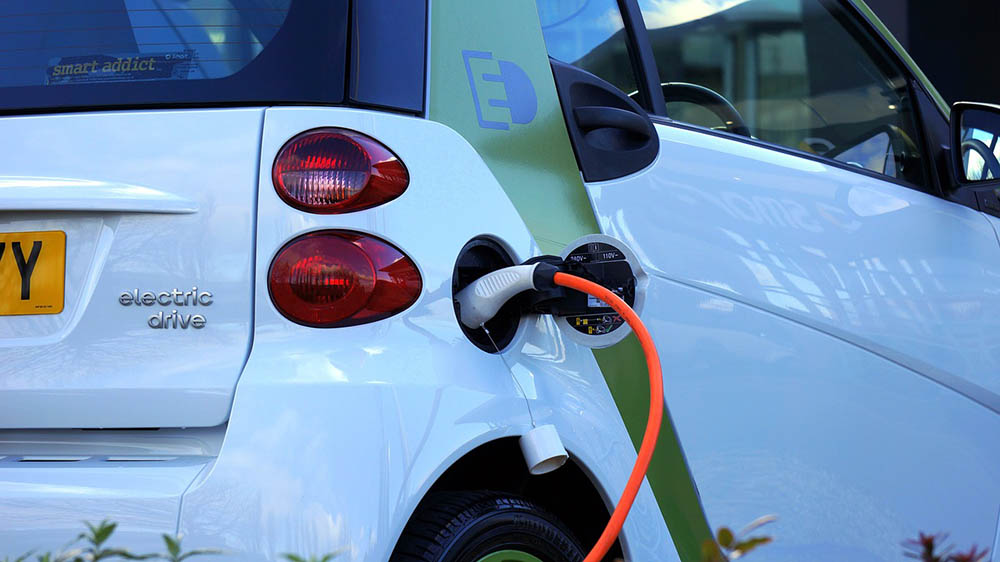
9. 31% of electric car owners reported issues within the first 4 years.
(Bloomberg)
A consumer poll determined that around 31% of electric car owners reported problems with their electric vehicles within the first four years. Now, this isn’t to say that every gas or diesel vehicle purchased is without issues. And there’s a warranty on a new electric vehicle, so that’s not really the issue.
The primary problem is that if electric components go wrong, it’s much harder for the average consumer to work on their vehicles. So, they’re forced to go to a dealer or qualified mechanic. These problems aren’t unique to electric vehicles, but they have many more of these types of components.
 Frequently Asked Questions About Electric Cars
Frequently Asked Questions About Electric Cars
What types of electric vehicles are there?
There are three main types of electric vehicles currently on the market. The first is the primary one discussed in this article: the fully electric vehicle. These run entirely on electricity from an onboard battery.
Another option is the plug-in hybrid, powered by an electric motor and gasoline engine. It switches automatically to the gas engine once the battery is depleted. These cars allow you to drive hundreds of kilometers on a single tank of fuel.
The third option is a hybrid. These are more of an “electrified” vehicle versus an electric one. Like a plug-in hybrid, a traditional hybrid has a gas and electric motor. The primary difference is that there’s no need to plug in because the gas motor actually charges the electric motor.
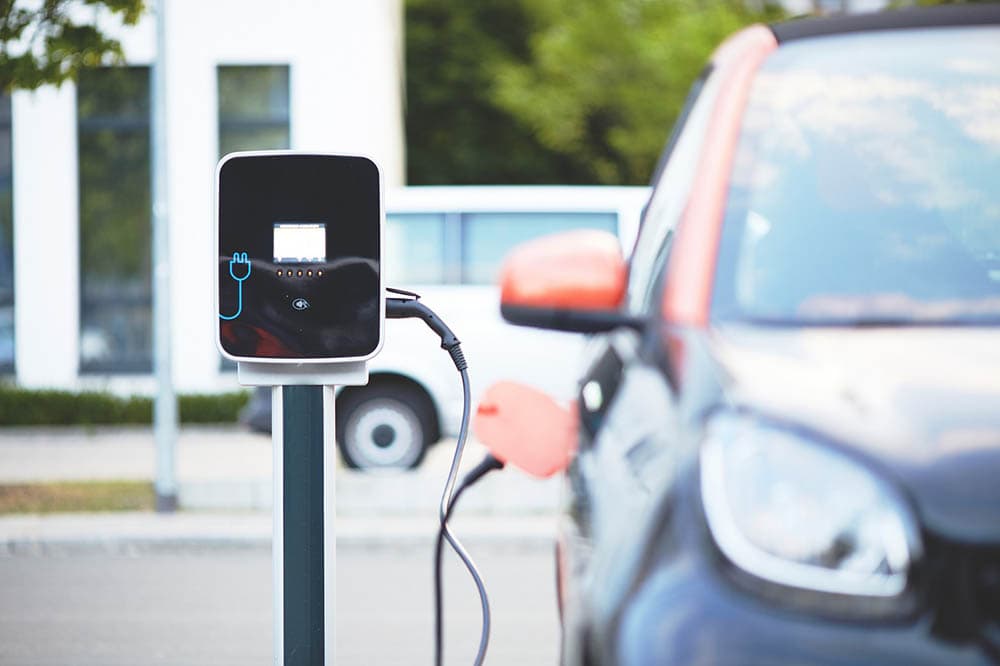
How long does an electric vehicle need to charge?
A few variables determine how long an electric vehicle will take to charge. For example, the size of the battery is a factor. The type of charge is another. As a result, a vehicle may be charged in as little as 30 minutes, whereas a bigger battery on a slow charge could take upwards of 12 hours.
Are electric vehicles expensive?
At a glance, many electric vehicles are typically much more expensive than an equivalent gas car. However, several things offset that cost. For example, federal and provincial governments have a few different rebates for electric and plug-in hybrid vehicles. Additionally, the fuel savings over time can be huge, especially if you’re able to use public charging to save on the electric bill. (GovCanada)
 Conclusion
Conclusion
The electric vehicle industry does not show any signs of slowing down in the years to come. If anything, there will be a bigger push in the upcoming years to meet Canada’s net-zero emissions goal by 2050. Some major manufacturers, such as Ford and General Motors, are going all-in on new electric and hybrid vehicles.
See also:
- 21 Electric Car Statistics and Facts in the UK
- 11 Electric Car Statistics and Facts in Australia
- 11 Car Pollution Statistics in Canada
Featured Image Credit: kalhh, Pixabay
Contents


